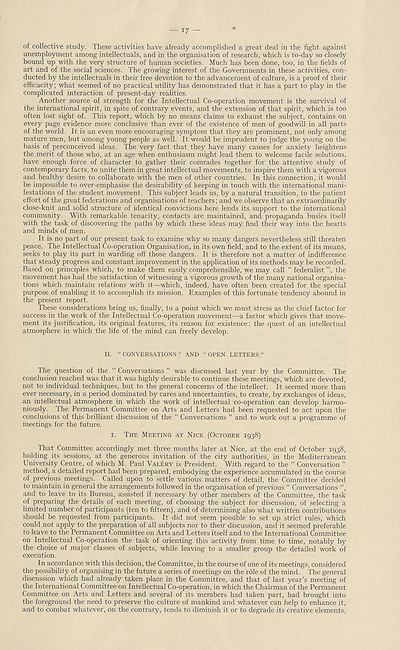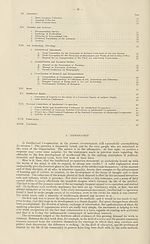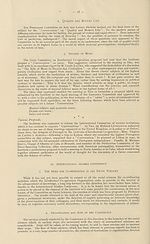International > Report by the committee on the work of its ... plenary session > Twenty first plenary session
(17)
Download files
Complete book:
Individual page:
Thumbnail gallery: Grid view | List view

— I? —
of collective study. These activities have already accomplished a great deal in the tight against
unemployment among intellectuals, and in the organisation of research, which is to-day so closely
bound up with the very structure of human societies. Much has been done, too, in the fields of
art and of the social sciences. The growing interest of the Governments in these activities, con¬
ducted by the intellectuals in their free devotion to the advancement of culture, is a proof of their
efficacity; what seemed of no practical utility has demonstrated that it has a part to play in the
complicated interaction of present-day realities.
Another source of strength for the Intellectual Co-operation movement is the survival of
the international spirit, in spite of contrary events, and the extension of that spirit, which is too
often lost sight of. This report, which by no means claims to exhaust the subject, contains on
every page evidence more conclusive than ever of the existence of men of goodwill in all parts
of the world. It is an even more encouraging symptom that they are prominent, not only among
mature men, but among young people as well. It would be imprudent to judge the young on the
basis of preconceived ideas. The very fact that they have many causes for anxiety heightens
the merit of those who, at an age when enthusiasm might lead them to welcome facile solutions,
have enough force of character to gather their comrades together for the attentive study of
contemporary facts, to unite them in great intellectual movements, to inspire them with a vigorous
and healthy desire to collaborate with the men of other countries. In this connection, it would
be impossible to over-emphasise the desirability of keeping in touch with the international mani¬
festations of the student movement. This subject leads us, by a natural transition, to the patient
effort of the great federations and organisations of teachers; and we observe that an extraordinarily
close-knit and solid structure of identical convictions here lends its support to the international
community. With remarkable tenacity, contacts are maintained, and propaganda busies itself
with the task of discovering the paths by which these ideas may find their way into the hearts
and minds of men.
It is no part of our present task to examine why so many dangers nevertheless still threaten
peace. The Intellectual Co-operation Organisation, in its own field, and to the extent of its means,
seeks to play its part in warding off those dangers. It is therefore not a matter of indifference
that steady progress and constant improvement in the application of its methods may be recorded.
Rased on principles which, to make them easily comprehensible, we may call “ federalist ”, the
movement has had the satisfaction of witnessing a vigorous growth of the many national organisa¬
tions which maintain relations with it—which, indeed, have often been created for the special
purpose of enabling it to accomplish its mission. Examples of this fortunate tendency abound in
the present report.
These considerations bring us, finally, to a point which we must stress as the chief factor for
success in the work of the Intellectual Co-operation movement—a factor which gives that move¬
ment its justification, its original features, its reason for existence: the quest of an intellectual
atmosphere in which the life of the mind can freely develop.
II. “ CONVERSATIONS ” AND “ OPEN LETTERS ”
The question of the “ Conversations ” was discussed last year by the Committee. The
conclusion reached was that it was highly desirable to continue these meetings, which are devoted,
not to individual techniques, but to the general concerns of the intellect. It seemed more than
ever necessary, in a period dominated by cares and uncertainties, to create, by exchanges of ideas,
an intellectual atmosphere in which the work of intellectual co-operation can develop harmo¬
niously. The Permanent Committee on Arts and Letters had been requested to act upon the
conclusions of this brilliant discussion of the “ Conversations ” and to work out a programme of
meetings for the future.
i. The Meeting at Nice (October 1938)
That Committee accordingly met three months later at Nice, at the end of October 1938,
holding its sessions, at the generous invitation of the city authorities, in the Mediterranean
University Centre, of which M. Paul Valery is President. With regard to the “ Conversation ”
method, a detailed report had been prepared, embodying the experience accumulated in the course
of previous meetings. Called upon to settle various matters of detail, the Committee decided
to maintain in general the arrangements followed in the organisation of previous “ Conversations ”,
and to leave to its Bureau, assisted if necessary by other members of the Committee, the task
of preparing the details of each meeting, of choosing the subject for discussion, of selecting a
limited number of participants (ten to fifteen), and of determining also what written contributions
should be requested from participants. It did not seem possible to set up strict rules, which
could not apply to the preparation of all subjects nor to their discussion, and it seemed preferable
to leave to the Permanent Committee on Arts and Letters itself and to the International Committee
on Intellectual Co-operation the task of orienting this activity from time to time, notably by
the choice of major classes of subjects, while leaving to a smaller group the detailed work of
execution.
In accordance with this decision, the Committee, in the course of one of its meetings, considered
the possibility of organising in the future a series of meetings on the role of the mind. The general
discussion which had already taken place in the Committee, and that of last year’s meeting of
the International Committee on Intellectual Co-operation, in which the Chairman of the Permanent
Committee on Arts and Letters and several of its members had taken part, had brought into
the foreground the need to preserve the culture of mankind and whatever can help to enhance it,
and to combat whatever, on the contrary, tends to diminish it or to degrade its creative elements.
of collective study. These activities have already accomplished a great deal in the tight against
unemployment among intellectuals, and in the organisation of research, which is to-day so closely
bound up with the very structure of human societies. Much has been done, too, in the fields of
art and of the social sciences. The growing interest of the Governments in these activities, con¬
ducted by the intellectuals in their free devotion to the advancement of culture, is a proof of their
efficacity; what seemed of no practical utility has demonstrated that it has a part to play in the
complicated interaction of present-day realities.
Another source of strength for the Intellectual Co-operation movement is the survival of
the international spirit, in spite of contrary events, and the extension of that spirit, which is too
often lost sight of. This report, which by no means claims to exhaust the subject, contains on
every page evidence more conclusive than ever of the existence of men of goodwill in all parts
of the world. It is an even more encouraging symptom that they are prominent, not only among
mature men, but among young people as well. It would be imprudent to judge the young on the
basis of preconceived ideas. The very fact that they have many causes for anxiety heightens
the merit of those who, at an age when enthusiasm might lead them to welcome facile solutions,
have enough force of character to gather their comrades together for the attentive study of
contemporary facts, to unite them in great intellectual movements, to inspire them with a vigorous
and healthy desire to collaborate with the men of other countries. In this connection, it would
be impossible to over-emphasise the desirability of keeping in touch with the international mani¬
festations of the student movement. This subject leads us, by a natural transition, to the patient
effort of the great federations and organisations of teachers; and we observe that an extraordinarily
close-knit and solid structure of identical convictions here lends its support to the international
community. With remarkable tenacity, contacts are maintained, and propaganda busies itself
with the task of discovering the paths by which these ideas may find their way into the hearts
and minds of men.
It is no part of our present task to examine why so many dangers nevertheless still threaten
peace. The Intellectual Co-operation Organisation, in its own field, and to the extent of its means,
seeks to play its part in warding off those dangers. It is therefore not a matter of indifference
that steady progress and constant improvement in the application of its methods may be recorded.
Rased on principles which, to make them easily comprehensible, we may call “ federalist ”, the
movement has had the satisfaction of witnessing a vigorous growth of the many national organisa¬
tions which maintain relations with it—which, indeed, have often been created for the special
purpose of enabling it to accomplish its mission. Examples of this fortunate tendency abound in
the present report.
These considerations bring us, finally, to a point which we must stress as the chief factor for
success in the work of the Intellectual Co-operation movement—a factor which gives that move¬
ment its justification, its original features, its reason for existence: the quest of an intellectual
atmosphere in which the life of the mind can freely develop.
II. “ CONVERSATIONS ” AND “ OPEN LETTERS ”
The question of the “ Conversations ” was discussed last year by the Committee. The
conclusion reached was that it was highly desirable to continue these meetings, which are devoted,
not to individual techniques, but to the general concerns of the intellect. It seemed more than
ever necessary, in a period dominated by cares and uncertainties, to create, by exchanges of ideas,
an intellectual atmosphere in which the work of intellectual co-operation can develop harmo¬
niously. The Permanent Committee on Arts and Letters had been requested to act upon the
conclusions of this brilliant discussion of the “ Conversations ” and to work out a programme of
meetings for the future.
i. The Meeting at Nice (October 1938)
That Committee accordingly met three months later at Nice, at the end of October 1938,
holding its sessions, at the generous invitation of the city authorities, in the Mediterranean
University Centre, of which M. Paul Valery is President. With regard to the “ Conversation ”
method, a detailed report had been prepared, embodying the experience accumulated in the course
of previous meetings. Called upon to settle various matters of detail, the Committee decided
to maintain in general the arrangements followed in the organisation of previous “ Conversations ”,
and to leave to its Bureau, assisted if necessary by other members of the Committee, the task
of preparing the details of each meeting, of choosing the subject for discussion, of selecting a
limited number of participants (ten to fifteen), and of determining also what written contributions
should be requested from participants. It did not seem possible to set up strict rules, which
could not apply to the preparation of all subjects nor to their discussion, and it seemed preferable
to leave to the Permanent Committee on Arts and Letters itself and to the International Committee
on Intellectual Co-operation the task of orienting this activity from time to time, notably by
the choice of major classes of subjects, while leaving to a smaller group the detailed work of
execution.
In accordance with this decision, the Committee, in the course of one of its meetings, considered
the possibility of organising in the future a series of meetings on the role of the mind. The general
discussion which had already taken place in the Committee, and that of last year’s meeting of
the International Committee on Intellectual Co-operation, in which the Chairman of the Permanent
Committee on Arts and Letters and several of its members had taken part, had brought into
the foreground the need to preserve the culture of mankind and whatever can help to enhance it,
and to combat whatever, on the contrary, tends to diminish it or to degrade its creative elements.
Set display mode to:
![]() Universal Viewer |
Universal Viewer | ![]() Mirador |
Large image | Transcription
Mirador |
Large image | Transcription
Images and transcriptions on this page, including medium image downloads, may be used under the Creative Commons Attribution 4.0 International Licence unless otherwise stated. ![]()
| League of Nations > International > Report by the committee on the work of its ... plenary session > Twenty first plenary session > (17) |
|---|
| Permanent URL | https://digital.nls.uk/195386274 |
|---|
| Attribution and copyright: |
|
|---|---|
| Shelfmark | LN.XII.5 |
|---|---|
| Shelfmark | LN.XII |
|---|
| Description | Over 1,200 documents from the non-political organs of the League of Nations that dealt with health, disarmament, economic and financial matters for the duration of the League (1919-1945). Also online are statistical bulletins, essential facts, and an overview of the League by the first Secretary General, Sir Eric Drummond. These items are part of the Official Publications collection at the National Library of Scotland. |
|---|---|
| Additional NLS resources: |
|

